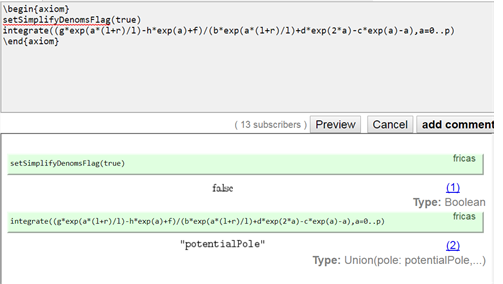I'm trying to solve the following ODE
$\qquad \dot{x}_t = \frac{e^{-x_{t}} r (\pi + \frac{\lambda \gamma}{\lambda + r} - \frac{c}{\lambda}) - e^{\frac{r}{\lambda} x_t} \left( \frac{c}{\lambda (\pi+\gamma)-c}\right)^{1+\frac{r}{\lambda}} \frac{r\lambda\gamma}{\lambda+r} + r (\pi - 2 c / \lambda) - \frac{cr}{\lambda} e^{x_{t}}}{-e^{-x_t} \frac{(\lambda \pi -c)r}{\lambda (\lambda + r)} - e^{\frac{r}{\lambda} x_{t}} \left( \frac{c}{\lambda (\pi+\gamma)-c}\right)^{\frac{r}{\lambda}} \left( \left( \frac{c}{\lambda (\pi+\gamma)-c}\right) \frac{r\lambda \gamma}{\lambda + r} + \frac{rc}{\lambda} \left( \frac{1}{\lambda + r} + \frac{1}{r}\right) \right) +\frac{c}{\lambda} } $
where all the constants are positive real numbers. I tried DSolve but it did not work. For example, naming the constants a to f:
DSolve[
{y'[x] ==
(a/E^y[x] - E^((r/l) y[x]) b + c - d E^y[x])/(-(f/E^y[x]) - E^((r/l) y[x]) g + h),
y[0] == p},
y[x], x]
But nothing happens (the evaluation runs forever). Can anybody help me to get an analytical solution?







Einstead ofe. $\endgroup$